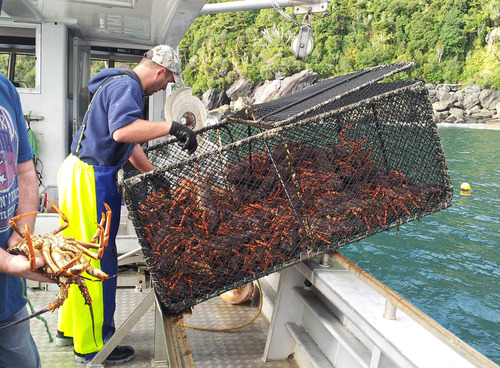WELLINGTON, April 12 (Xinhua) -- New Zealand's lobster exporters are optimistic about post-COVID exports to China, boosted by an upgraded free trade agreement (FTA) that entered into force last week.
"We are definitely optimistic about post-COVID exports, as Chinese consumers return to restaurants and enjoy celebrating together again," Fiordland Lobster Company General Manager Andrew Harvey told Xinhua on Tuesday.
The company is New Zealand's largest exporter of live rock lobsters. Harvey noted that China's National Day Golden Week in October is always one of the most important events on the calendar for lobster exports.
"We're optimistic that it will be again this year, if COVID-19 allows," Harvey said. His company started lobster export to China in the 1990s.
A recent good news for New Zealand's export sector is the protocol on upgrading the China-New Zealand FTA taking effect last Thursday.
The upgraded FTA makes exporting to China easier and reduces compliance costs for New Zealand exporters by addressing a range of non-tariff issues, such as a six-hour limit on customs clearance of perishable goods and proper storage while pending release.
"This will give New Zealand exporters, especially exporters of fresh seafood and fruit, more confidence that their cargo will be processed with minimal delay and reduce spoilage, which will save time and money," Huang Yuefeng, the economic and commercial counselor of the Chinese embassy in New Zealand, told Xinhua.
Over the last two years the COVID-19 pandemic has led to frequent interruptions and challenges for lobster exports, Harvey said.
"Fortunately, the governments of New Zealand and China have both handled COVID-19 pretty well, so overall business has been able to continue through the challenges," Harvey said, adding that both New Zealand exporters and Chinese importers have experience in handling COVID-related conditions.
The lobster fisheries in New Zealand are very healthy, and demand from Chinese consumers is good when restaurants are open, "so we just need to manage the COVID-related challenges that come up. Those are unpredictable," Harvey said.
They are ready to react quickly to changing conditions and work closely with their Chinese importer clients, he said.
New Zealand's rock lobster export industry is estimated at around 300 million New Zealand dollars (roughly 205 million U.S. dollars) per annum, statistics show.
China is New Zealand's largest export market for lobsters, Harvey said, noting that wealthy lobster consumers are mainly from southern Chinese cities such as Shenzhen and Guangzhou, where seafood consumption is traditionally large.
Helicopters and insulated trucks are used to fly live lobsters from the depots to one of the company's exports packing factories in New Zealand in order to keep lobsters fresh, he said. "Lobsters cannot be bred artificially and must be caught in remote sea areas."




 A single purchase
A single purchase









